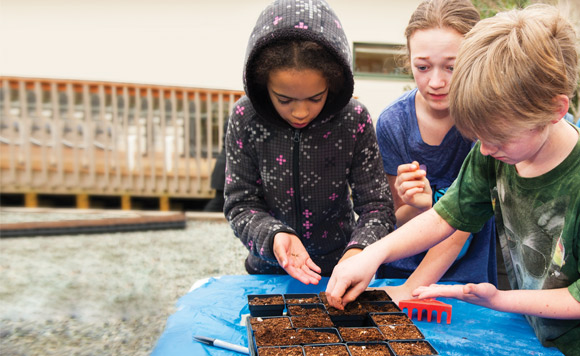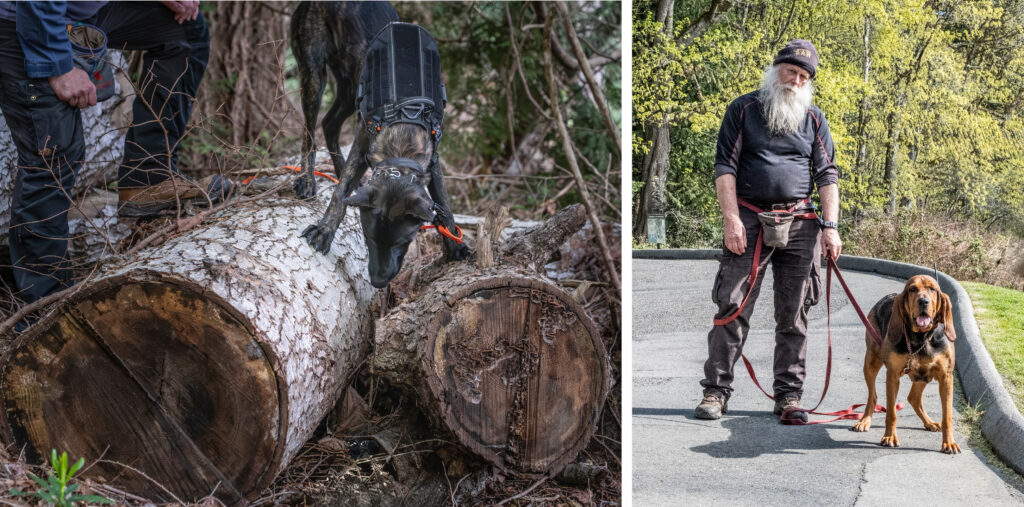by Janice Henshaw –
Who will grow our food? According to 2011 census data, farmers make up 1.5% of B.C.’s population, and 54% of them are older than 55. Across Canada, B.C. had the lowest percentage of farms with young operators: less than 7% (i.e. operators under 40 years old).
Deep Cove Elementary School is doing its part in enacting change by becoming involved in the Growing Young Farmers School Program, founded by Dave Friend in 2010. All students in the school will have a chance to try their hands at growing and harvesting organic crops.
Along with parent volunteers, I visited Deep Cove School to witness the start of this program on a cold rainy day in early March.
To begin, everyone listened to a short talk by Mrs. Organic (aka Jenny Szulc) who started by asking the students, “Why on earth would you want to grow your own food when the grocery store has everything you could ever want?” Responses included “To save money,” “You can learn how to do it and do it yourself,” “You can make more seeds,” “Some people don’t have money,” and “It tastes better.”
Students ranging from kindergarten to grade five lined up in the school courtyard and stuck their fingers in individual pots to create tiny planting tunnels for their “mystery” seeds. A student asked how they would know where to plant the seeds if they didn’t know what they were planting. Mrs. Organic assured them that once the seeds sprouted “We will figure it out.” After planting their seeds, the first class was encouraged to check out the plants in the courtyard; the edible kale was a big hit. I’m told it was “decimated!”
Some of the students shared their take on vegetables with me. “Carrots with the tops on them, they’re my favourite,” said Gabriel. Amber has a big yard with two greenhouses and likes to climb the fruit trees. Lucca confided that she didn’t care all that much for vegetables, but likes broccoli when her mom puts it in a salad with cheese sauce. Callum didn’t want to plant anything, but added that he likes eating strawberries, and red and yellow peppers, nix to the green ones. “Carrots are cool,” said Dawson.
As a Grower Educator with Growing Young Farmers, Jenny sums up the program: “I can’t think of a better way to make our children healthier than by teaching them to grow their own food.” In doing so, she said that kids connect with what they are eating, and take ownership and pride in what their have grown. An additional aspect is that “They appreciate the farmers who work so hard for us.”
Grant Franceschini, Deep Cove Elementary Principal, said he is especially excited about this project because “It supports new curricular directions so well and addresses several of our current school priorities – cross program, cross class and cross grade connections, community connections and student engagement through hands-on, authentic learning experiences.”
The community is involved too. Le Coteau Farms is providing greenhouse space for the seedlings, and students will be able to watch the seeds sprout with the use of time-lapse photography. Two neighbours are providing garden space: Billy Metcalfe, and 90-year-old Gerry Furstenau, who is providing four beds for the seedlings and kid-sized benches and tables for the garden area.
Additional support for the program comes from parents, St. John’s United Church, HOPE (Helping Our Peninsula Environment), Growing Schools/LifeCycles Project Society, and from The North Saanich Food for the Future Society (NSFFS). Penny Gibbs, NSFFS President, said her society is thrilled to provide a grant for the program because she believes there is a disturbing disconnect between consuming food and knowing where it came from. “The school’s plan is to grow vegetables, and our plan is to grow young farmers!”
“One way to think of this is food for thought,” said Louise Beaudry, who teaches grades 2/3. “Literally, we hope the kids will be learning valuable skills they can use for life and become community stewards and advocates for gardening.” She points out that appreciating, understanding and tasting the organic lifecycle is part of the larger understanding of our planet as our vital life support system.
Cathy Challinor, kindergarten/grade 1 teacher, loves connecting students to nature and thinks this project is one more way to get kids’ hands in the dirt. “Gardening offers a rich source of teaching possibilities, including making healthy choices, the web of life, and carrying on our mindfulness journey with a ‘farming of gratitude’ for the organic vegetables given back from the earth to nourish us.”
As the last seed was planted, a young student named Quinn came over and gave me final instructions about plants: “Make sure you water them.” Under the guidance of passionate teachers, and supported by the parents and the community, our young farmers are off to a great start. May the seeds germinate, and the veggies grow tall and delicious!
Photo by www.nuttycake.com.




